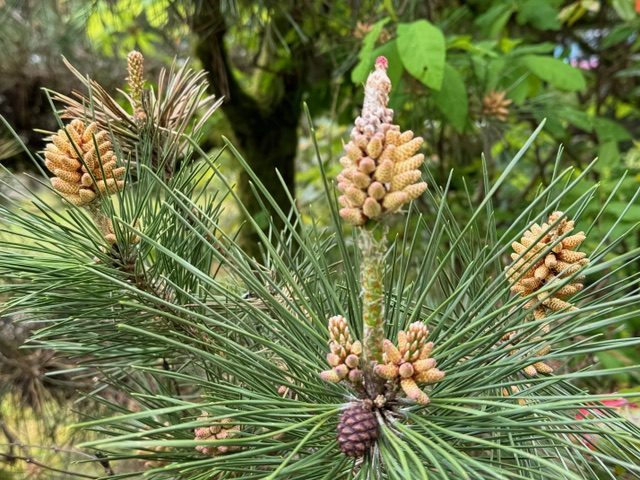by Christine Sine
Over the last couple of weeks I have shared a number of posts about the values to our spiritual well being of getting outside to pray, to draw close to God and strengthen our spiritual well being. On Saturday, in my reminder about the Spirituality of Gardening Webinar I asked if we needed an excuse to get out of the house. The answer is a resounding “yes”. It is not just good for our spiritual well being but for our physical, and emotional wellbeing too.
A growing number of followers of Jesus admit that the place they feel closest to God is in nature. Eco-spirituality is gaining momentum in both the Protestant and Catholic Churches and movements like Wild Church, and Forest Church are attracting adherents in many Western countries. Others are disconnecting from church all together and creating their own nature based expressions of faith or drawing from indigenous or Celtic perspectives. It’s not surprising. Research continues to demonstrate that being outside and experiencing nature can improve our mental and physical health and increase our ability to focus. In Britain in particular, green social prescribing is becoming more common and of course all of us have heard of the benefits of forest bathing which now reaches far beyond Japan in its impact.
Unfortunately, many of us spend a good part of our day in front of a screen — computer, TV, or smartphone. We spend less time outside experiencing the natural world. Research from the US Department of Agriculture, suggests however that getting outside has huge benefits for all of us. People who live near parks and green space have less mental distress, are more physically active, and have longer life spans. Exposure to nature may decrease death from chronic disease. When people exercise outdoors in nature, they do so for longer periods of time and at greater intensities. Positive health effects are enhanced when green space includes water.
You don’t have to bike a triathlon or ski down a mountain to enjoy exercise in nature. Any activity that gets your body moving in a way that’s doable for you, like gardening, playing with your dog at the park, or washing your car, can offer some health benefits.
As you know I love being outdoors, and not just in the garden. I make every excuse possible to go outside to photograph the neighbourhood, smell the flowers and get some exercise. My Fitbit reminds me every hour that I need to stretch and spend time walking so a quick dash outside is always a welcome break. I try to incorporate breathing exercises, reading prayers, or other spiritual exercises into these breaks and I know how much of a difference this makes for me.
If you are not convinced yet here are a few ideas that reinforce the fact that we are both made of the earth and for the earth.

1. Nature improves our thinking, reasoning, and other mental abilities.
When we’re in urban environments or the office all day, we can experience sensory overload, resulting in tension and mental fatigue. Studies show that our minds and bodies relax in nature which increases feelings of pleasure and helps us concentrate and focus more effectively, according to studies in the National Library of Medicine.
Being outdoors also relaxes our minds, something that I am very aware of as I walk my dog or wander my garden in the afternoon. Nature provides a mental health break, allowing us to temporarily escape the demands of everyday life. It can also boost your creativity and problem-solving abilities. If you’re suffering from writer’s block or can’t seem to solve a problem at work, step outside for a few minutes of fresh air. Walk leisurely around your neighborhood or office. The answers might come tumbling into your mind.
2. Nature improves physical wellness
Getting out into nature often encourages us to walk, bike, hike, or kayak more frequently. People typically engage in regular physical activity when they’re in nature. So, stepping outside can help you keep a healthy weight or even lose weight by increasing activity levels.
Studies show that being in nature reduces cortisol levels, muscle tension, and lowers heart rate and blood pressure resulting in lower rates of heart disease. The great outdoors can also helps increase your vitamin D level, which is important for our bones, blood cells, and immune system.
3. Being outside improves mental health
Nature helps decrease your anxiety levels and can help lessen stress and feelings of anger. Exercise can also help this, but it’s even better when you’re outside.
Regular access to green spaces has been linked to lower risks of depression and improved concentration and attention. Being outside allows us to be social and come together with family, friends, or even people you don’t know who are also looking for a great hiking trail, for example.
Additionally, you may find that you sleep better when you are regularly outside. Daily exposure to natural light helps regulate sleep/wake cycles. By making sure that you get outside in sunlight every day, you can improve your ability to sleep at night. One of my friends has developed an evening ritual where she sits outside to watch the sunset every evening while reciting scripture and prayers. It has made a huge difference to her sleep. The nice thing about sunlight is that it doesn’t cost a thing. To get a daily dose, you only need to step outdoors.
Just keep in mind that sunlight needs to enter your eyes to affect your circadian rhythm. If you’re hoping to improve your sleep, picnicking at the beach may help more than napping in a shady wooded area.
Nature can also have benefits for children. One study in Denmark examined 900,000 residents born between 1985 and 2003. They found that children who lived in neighborhoods with little green space had up to 55% higher risk of developing a psychiatric disorder independent from effects of other known risk factors.

4. Better breathing
Air pollution can trigger allergies, asthma, and other respiratory diseases, which I am very aware of as I suffer from both allergies and asthma.. It might surprise you to learn, though, that indoor concentrations of air pollutants are often two to five times higher than outdoor concentrations. Glass cleaners, air fresheners, bleach and cleaning sprays are all filled with toxic chemicals. It’s one of the reasons I have so many plants inside. They help improve the air quality. But spending more time in natural green spaces could help lower your risk of respiratory concerns.
5. Boosted immune function
We all became aware during the COVID shutdown that good air circulation made us less vulnerable to this and other viruses. However, spending time outdoors helps our immune system in other ways too. Exposure to microorganisms found in the soil boost our immune system and make us less vulnerable to serious illnesses. That is one of the reasons that hospitals often give birth to particularly virulent viruses and bacteria. In a completely sterile environment, our immune systems lose their ability to recognize what is and isn’t dangerous. It may then set off a red alert for any microorganism it comes across, which can lead to chronic inflammation. As well as that, soil contains antibiotic like substances that help us resist infection. So, while soap is a wonderful invention, getting muddy once in a while, even eating al little dirt, can be good for us, too.
6. Protection from short-sightedness
There is even evidence that suggests children who spend plenty of time outside have a lower chance of becoming nearsighted. Increasing the eye-work distance when doing close-up work and taking a break after 30 minutes of close-up work also offers some protection. Experts are not sure why, but speculate that natural light offers a brighter and richer collection of light wavelengths to see with. Second, the outdoors lets your eye practice looking at objects from various distances. third, light stimulates the retina to produce dopamine, which prevents your eyeball from stretching out and warping your vision. Regular outdoor activities in childhood, like playing catch, swimming, and going sledding might just save your kid a trip to the optometrist down the line. Maybe doing church outside will help too.
Evidently 2 hours a week is seen as the magic mark. Below that nature does not seem to make much of a difference. However when you think about it that is only 17 minutes a day, or 10 minutes in the morning and 10 minutes in the evening.
If you have a busy schedule and don’t have much time to get outside, these may help you get a quick nature fix:
- Stand outside with the sun on your face or take off your shoes to feel the grass in between your toes. If the weather isn’t great, take a few minutes to gaze out a window at the scenery outside. Do this twice a day for 10 minutes once in the morning and once in the evening. Consider reciting a Psalm like Psalm 145 as you do so.
- Go out for a half hour walk every couple of days.
- Eat your lunch outside or plan some outside meetings or phone calls.
Other fun ideas to experience nature
- Plan a picnic with friends or family. Find a park or green space to enjoy a meal and maybe take a frisbee or soccer ball.
- Rent a kayak or canoe on a nearby river or lake.
- Find a hiking trail you’ve never been to.
- Dust off your bicycle and go for an easy ride around the neighborhood. Even an e-bike will do the job.
- Take your dog for a walk to a nearby park — they’ll enjoy it just as much as you will.
- Grab a book and find a shady tree to sit under.
- Plant a vegetable or flower garden in your yard or on your patio.
- Take up golfing, pickle ball or tennis with a friend or family member.
- Meet up with a neighbor or friend to walk daily or weekly.
- Go bird watching at a nearby state park or wildlife habitat.
So it’s time to figure out how to make your outside time count. Read back through my posts from the last couple of weeks which suggest how to pray, draw close to God and strengthen our spiritual health while outside. Prayerfully consider ways that you too could come to know the God who is everywhere and in everything in a more intimate way. It is good for us, for God and for our planet.

